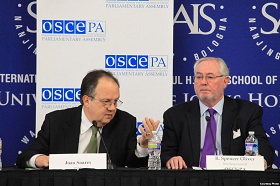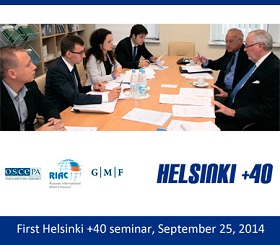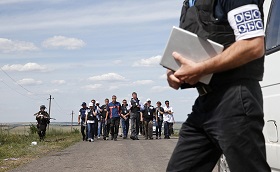August 2015 marks the 40th anniversary of the Helsinki Final Act. The period remaining before this milestone offers enough time to fulfill the commitments undertaken and, looking towards the future and capitalizing on past achievements, to develop concrete strategies for the OSCE and participant States. The OSCE Parliamentary Assembly together with the Russian International Affairs Council and other think tanks have launched the “Helsinki+40” project. In the following discussion, Mr. Spencer Oliver, the OSCE Parliamentary Assembly Secretary General, comments on the role of the OSCE in the modern world and in the resolution of the Ukraine crisis, as well as assesses the role of parliamentary diplomacy.
August 2015 marks the 40th anniversary of the Helsinki Final Act. The period remaining before this milestone offers enough time to fulfill the commitments undertaken and, looking towards the future and capitalizing on past achievements, to develop concrete strategies for the OSCE and participant States. The OSCE Parliamentary Assembly together with the Russian International Affairs Council and other think tanks have launched the “Helsinki+40” project. In the following discussion, Mr. Spencer Oliver, the OSCE Parliamentary Assembly Secretary General, comments on the role of the OSCE in the modern world and in the resolution of the Ukraine crisis, as well as assesses the role of parliamentary diplomacy.
What is the role of parliamentary diplomacy in the modern world, especially under the new conditions of relations between Russia and the West?
Parliamentary diplomacy is all about dialogue between elected officials in democratic nations. In the OSCE, all nations are supposed to be democratic. Parliamentarians are people who influence policy and governments and who can bring some expertise and ideas to bear to try and resolve problems and overcome difficulties. Most leaders in democracies eventually came up through the parliamentary system through the electoral process. So, parliamentarians have something in common: they are elected, they represent a constituency of people or regions or states, they’re interested in the welfare of their country, and they’re responsible for it to a large extent. This dialogue allows parliamentarians from different countries, different cultures, and different ideologies to communicate with each other about mutual problems and areas of mutual interest. So, it’s always good to keep that channel open, because sometimes parliamentarians can speak more frankly and openly than governments can at an official level. It’s a valuable back channel, and a valuable communications avenue for political leaders in various countries to talk to each other on a regular basis.
The OSCE is making a significant contribution to crisis management in Ukraine. Mr. Oliver, what is your assessment of the current situation? What has been the main success that the OSCE has managed to achieve to date? In your opinion, what is the main obstacle to resolving the crisis at the moment?
I think the OSCE has used virtually every tool in its toolbox to try to prevent, avoid and resolve the Ukrainian crisis. We have an office in the country with a project coordinator in Ukraine who’s been there for some time and who has been in touch with, on a regular basis, with the leaders of the government, with NGOs and with parliamentarians and others. We sent OSCE monitors when the crisis in Ukraine occurred, but they were blocked and were unfortunately not allowed to go into Crimea. Even though the Helsinki Final Act and the various other OSCE documents indicated that they should be allowed to go there, they were not allowed. Our Representative on Freedom of the media went there and was very critical. She was not allowed to go back. Our special representative for minorities, the High Commissioner for National Minorities, also went there and was not allowed to go in and to talk to the Tatar population there. So they were blocked in Crimea, unfortunately, from doing their job.
The special monitoring mission which was eventually agreed to was held up for a long time in Vienna by the Russians who set conditions, delayed the deployment of this special monitoring mission, limited its access to certain areas and put certain other geographical limitations on what they could do. However, once the decision finally taken, the OSCE demonstrated its efficiency, deploying the mission overnight – from 21 to 22 March. So the fact is that there have been special monitors there, and there have been special representatives. There’s a special negotiating group moderated by the chairman in office. And they have played, I think, an important role in trying to facilitate communication between the conflicting parties, to find some ways to talk through the problems and to resolve them in a peaceful manner, rather than through violence. They have not been completely successful, obviously, but they have made a contribution to keeping things from getting worse, in my opinion. The OSCE is the only place where everybody has a seat at the table on an equal basis. But the consensus rule is sometimes abused where people use their veto to prevent the OSCE from acting in a swift way when a crisis arrives, and that has certainly been the case in Ukraine. The danger here is that almost all of the fundamental principles, the Decalogue of principles in the Helsinki Final Act have been violated by what has occurred in Crimea and in Eastern Ukraine. And so, the question now is: can the OSCE survive this?
So, can the OSCE survive? There have been numerous discussions about the need for reforming and strengthening the OSCE. What processes are going in the organization now? Are there any ongoing changes in structure, mandate, and decision-making process?
There are no pending structural or decision-making changes, unfortunately. We have been, as a Parliamentary Assembly, advocating changes, particularly to the consensus rule. The organization has functioned for a long time, because while the consensus rule is very valuable for people protecting their national interests and their national sovereignty, it also has allowed people to blackmail their way into having someone from their country put in a certain position or holding up action or preventing the smooth and efficient functioning of the organization. So, some attention needs to be paid to that aspect of it. You certainly need to be able to react in a crisis without having the perpetrator of the crisis blocking the ability to take action. One example is when the fighting broke out in Yugoslavia, and the OSCE, or it was then the CSCE, called an emergency meeting, and everyone came and they had some decisions to try to prevent the conflict from expanding into an all-out war, but the Yugoslav side blocked these decisions. Here was the country that was the cause of the crisis blocking the OSCE’s ability to do something about it. This is one of the reforms that needs to be examined very closely. It probably will not be examined in the middle of the crisis, but after it’s over people will look back on the crisis and think: “What could we have done to prevent this from happening?” So, there needs to be some kind of mechanisms to allow them to address emergency problems and the crises without being blocked by people who have violated the principles of the Helsinki Final Act and Charter of Paris and other agreements. The OSCE has language in the Decalogue principles and in Basket 2 and in Basket 3 not only about security questions, but also about cooperation in the field of the environment and in economic cooperation and also in human rights and fundamental freedoms. And this language which everyone has agreed at a political level to observe is very good, and it is altruistic, and I think it covers the general areas that need to be addressed in state-to-state relations, and not only in state-to-state relations but also the commitments that people make about how each state will treat its own citizens. But, unfortunately, some countries have not observed those provisions, they have not kept the promises they made in Helsinki and in Paris, and so now you have a very serious crisis. The question has to be asked, “What good are agreements like this if the people who sign them don’t agree to follow them?”
What is the way out?
Well, I think dialogue is the way out, and I think the more dialogue we have, the better. That’s what this Helsinki +40 Colloquium Project is all about. The fortieth anniversary of the Helsinki Act comes up next year. We’ll have our annual session in Helsinki in July 2015, shortly before the actual anniversary itself. We are partnering with RIAC and with the German Marshall Fund in the United States and with SIPRI in Sweden and with the Finnish Foreign Affairs Council to hold a series of seminars and dialogues to talk about the OSCE. We’ll talk about what it has done, where it is today and hopefully, make some recommendations on how it can move forward in the future. So, hopefully, this crisis will pass and the OSCE will survive this crisis and will adjust its mechanisms and its procedures in a way that will prevent these kinds of crises from taking place in the future.
Do you believe that “Helsinki +40” project and upcoming seminars will have a practical impact?
I hope so. As you know, we’re engaging some very knowledgeable and experienced people, diplomats, former diplomats, parliamentarians, academics, and experts who will certainly have an opportunity to have a dialogue about this, and this is a timely thing to do. The first seminar will take place in Moscow on 25th of September, and then on the 18th of November we will be in Washington DC with the German Marshall Fund, and then in Sweden in March. As we go through, of course, the Ukrainian crisis will be the elephant in the room, the thing that everybody will be talking about and considering how the OSCE can contribute to solving the problem, what the OSCE might have been able to do to prevent the problem, what the OSCE can do in the future to prevent these problems, and what the OSCE can do to adjust itself to be what it was intended to be, which is a mechanism to provide security and prosperity and trust among all the countries, the signatory countries of Europe and North America.
One more question on Ukraine, if I may. What status for Novorossiya do you find most acceptable for the resolution of the crisis and the stabilization of the international environment? Should it become a part of Ukraine, or a part of Russia, or an independent state?
That will be up to the citizens of Ukraine. All of the signatory countries of the Helsinki Final Act have recognized the borders that existed at the time of the signing of the Helsinki Final Act. And the only legitimate way, the only recognized way to change those borders is by mutual agreement, as happened in Czechoslovakia between the Czech Republic and Slovakia, and as happened in Germany when East and West came together. But it has to be by mutual agreement, it can’t be by force, because if it’s by force no one’s going to recognize it, and it’s going to make the credibility of the Helsinki process very difficult and called in question. We know that there’s a difference between Eastern and Western parts of Ukraine culturally, to some extent linguistically, and so on. There needs to be a way to overcome that. But if they want to divide, it has to be something that they want, that they need to do. For instance, in Crimea, it should have been up to the Crimeans to decide whether they want to be part of Russia or part of Ukraine. It should not have been done at the barrel of a gun. I mean, it was under an occupation, and it was certainly not a legitimate referendum and certainly not recognized by any other country in the world that knows what democracy is all about.
Interviewer, Natalia Evtikhevich, RIAC program manager






